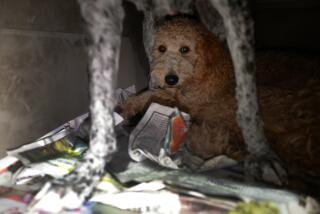Free website will allow buyers to check a vehicle’s hidden repair history
- Share via
A new public database may protect American consumers, keep rolling wrecks off the highways and save lives in the process.
The National Insurance Crime Bureau is creating a free public database of vehicles declared a total loss, “or totaled,” by insurers, allowing individuals to enter vehicle identification numbers, or VINs, to see if a set of wheels they want to buy has a hidden history.
The crime bureau, an organization of fraud busters funded by 1,000 of the nation’s insurance companies, will begin the online service at the end of this month. When it becomes operational, it can be found at www.nicb.org. Look for a link to the organization’s VINcheck system.
Unlike commercial databases that sell similar information, the crime bureau’s database will have access to the internal records of hundreds of the nation’s largest insurance companies and will be offering the most comprehensive information so far available, said Frank Scafidi, a spokesman for the organization.
“The best part of this is that it’s free,” he said.
How serious is the totaled vehicle problem? Huge and growing.
Over the last five years, nearly 12 million vehicles have been totaled by the insurance industry, most of them after collisions, but also after fires and floods.
A percentage of these vehicles -- estimates from collision industry experts put it at about 30% -- are recycled into the used car market. In California, at least 7% of all the vehicles on the road are salvaged from a “total” loss.
In the best case, these cars are carefully repaired and their histories are fully disclosed to future buyers. In the worst case, an unlicensed auto body shop performs a few Mickey Mouse frame adjustments, installs a phony inoperable air bag, sprays on a nice coat of paint and then washes the title in the interstate used car auction market.
The system has long jeopardized the safety of not only the buyers of these vehicles with substandard repairs but everybody who shares the road with them. It has also put a cloud over honest body shops, which have a tough time competing against outfits that cut corners.
“Our goal is to provide as much information as possible to consumers -- at no charge -- to protect them against fraudulent used car sales and potentially deadly accidents from driving unsafe vehicles,” said Robert M. Bryant, crime bureau president.
NICB began offering consumers access to VINs of troubled vehicles in October 2005, when it publicly posted the identities of about 300,000 vehicles and boats that had been caught in Hurricane Katrina. Those flooded vehicles were being recycled into the interstate used car market.
Then last November, the group expanded the program to include VINs of unrecovered stolen vehicles. About 1 million vehicles are stolen in the U.S. every year and on average only 63% are recovered. Of course, buying a hot car isn’t a great idea. If the police ever find it, you will be another victim of the crime, having to give up your car to its rightful owner.
But the totaled vehicle problem is a far bigger issue. About 2.5 million to 3 million vehicles are totaled every year. Auto manufacturers are making cars more difficult and costly to repair, resulting in more totaled vehicles of even late-model cars. Some luxury cars are being totaled with relatively minor damage, because costly aluminum frame systems are exceptionally difficult to repair.
The flip side of this problem is that insurers turn around and sell these cars into the auction market. As a result, some insurance companies have been reluctant to release VINs of their totaled vehicles, worried that it could hurt their recoveries.
So far, about 60% of the 1,000 insurers in the NICB have agreed to provide the crime bureau with the totaled VINs. They include State Farm, Allstate, Nationwide, Progressive, Mercury, Geico and the Auto Club. Scafidi hopes the rest of the industry will quickly join. Although it’s not complete, the NICB database is the most comprehensive that currently exists, Scafidi said.
After many years of resisting, major insurers are seeing that it is to their advantage to get consumers this information and force the salvage industry to clean up its act. There is theoretically nothing wrong with a properly repaired salvage car, but consumers need to be informed about a car’s history to make intelligent decisions. What’s more, federal legislation is pending that could force the industry’s hand in this.
California and some other states have responded to the larger problem with tough laws that require the titles of totaled cars and trucks to be branded as salvage vehicles. But many other states, particularly in the Midwest, have no title branding laws. As a result, unscrupulous repair operations can route cars through places such as Indiana and get a clean title, Scafidi said.
All of this is too late in coming. About 15 years ago, Congress authorized the National Motor Vehicle Title Information System, which was supposed to create a national database linked to state motor vehicle agencies. The system never got the needed funding, however, and now only a handful of states are participating. Here’s another example of misplaced federal spending priorities that hurt American consumers.
More to Read
Sign up for Essential California
The most important California stories and recommendations in your inbox every morning.
You may occasionally receive promotional content from the Los Angeles Times.














